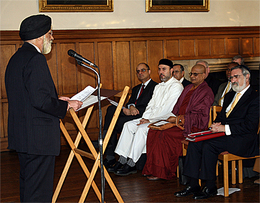Dr Indarjit Singh - common values in different faiths are key to a better future
 Dr Indarjit Singh
Dr Indarjit SinghMonday 16th November 2009
Dr Indarjit Singh CBE, Director of the Network of Sikh Organisations and Vice-Chair, Inter Faith Network for the UK, gives his reflections on the common values and understanding between different faiths.Read a transcript of Dr Indarjit Singh's reflections below, or click download on the right to listen [4Mb]
Archbishop, friends, it's a real pleasure to be asked to follow on that very inspiring address and to say a few words on progress and inter faith relations. It's a measure of this astonishing progress that a Sikh should be addressing a gathering here in Lambeth Palace and to be the first non Anglican to speak at British Cathedral later this week. In the same way Sikhs were delighted to have the Chief Rabbi, the Bishop of London and other faith leaders address us in our gatherings at the Royal Albert Hall.
A commitment to increasing respect and understanding between different beliefs and ways of life is so central to Sikh teachings that two of our Gurus gave their lives trying to build bridges of understanding between different faiths. I've always tried to follow their example, particularly as a founder member of the Inter Faith Network which owes its existence to the inspiring vision of Brian Pearce who is here with us today.
I suppose I've been asked to say a few words as the only remaining and battle scarred veteran still in active service since that early beginning in 1987 when my beard was a great deal darker. At the Inter Faith Network we've shown over the years that despite our differences we can work together on matters of common concern and national concern.
Perhaps the greatest success of inter faith activity is the recognition by both central and local government that religion is a central determinant of how we live, move, and have our being. It's a huge step from the time I asked the local council to look also at religious needs when they considered the needs of local communities. The reply, typical of the time, was short and sharp: "We don't want anything to do with all that bowing and chanting."
The Inter Faith Network helped establish the Inner Cities Religious Council chaired by a government minister. Despite early suspicions, on both sides, trust gradually grew. And there were many excellent achievements including the addition of the religious affiliation question in the 2001 census.
Increased understanding by government and others has been important to the recognition of faith in public life and has led to Hindu, Muslim and Sikh representatives at the Senate House Service which had been previously confined to Abrahamic religions. And other successes included the establishment of multi faith chaplaincies in prisons and the armed services, and similar developments in the health services and many other initiatives too numerous to mention in this brief review.
On a personal reflection a few years back I was surprised and delighted when a remark of mine on Thought for the Day about the need to include other faiths in the celebration of the Millennium, triggered the formation of a multi faith Lambeth Group meeting here in Lambeth Palace. And this in turn led to a moving Act of reflection and commitment in the House of Lords on the 3rd of January 2000. In an important parallel initiative also there was an agreement on common values found in our different faiths that would make for a better future for all of us.
Today we urgently need to revisit these values, which are the key to future cooperation for the common good and in moving us all to more responsible and compassionate living. Thank you.
